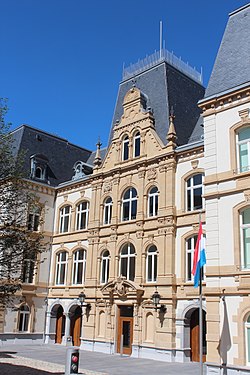Top Qs
Timeline
Chat
Perspective
Ministry of Foreign Affairs (Luxembourg)
From Wikipedia, the free encyclopedia
Remove ads
The Ministry of Foreign and European Affairs, Defence, Development Cooperation and Foreign Trade (Luxembourgish: Ministère des Affaires étrangères et européennes, de la Défense, de la Coopération et du Commerce extérieur, MAE), commonly referred to as the Ministry of Foreign Affairs, is a ministry of the government of Luxembourg, which comprises a general secretariat and eight directorates. The ministry is headquartered in the Bâtiment Mansfeld in Luxembourg City.[1]
Remove ads
The office of Minister of Foreign Affairs is customarily given to a member of the junior party in a coalition, and usually coincides with that of Deputy Prime Minister. For instance, LSAP politicians Jacques Poos and Jean Asselborn served a combined 34 years as Minister of Foreign Affairs in CSV and DP-led governments, 24 of which as Deputy Prime Minister.
Remove ads
Beginning
Summarize
Perspective
The position of Minister for Foreign Affairs has been in continuous existence since the promulgation of Luxembourg's first constitution, in 1848. Until 1937, the position was held concurrently by the Prime Minister,[2] thus ridding it of any true significance as an office. However, in 1937, Joseph Bech resigned as Prime Minister, but was immediately reappointed as Minister for Foreign Affairs upon Pierre Dupong's premiership. When Bech became Prime Minister again, in 1953, the two jobs were united once more.[3] Over the next twenty-six years, the jobs were separated and united another two times. However, since 1979, the two positions have been kept in separate hands.
Several times since World War II, the Minister for Foreign Affairs has also been the Deputy Prime Minister and leader of the smaller party in a coalition government; this has especially been the case since the 1980s.
Since 24 March 1936, the title of Minister for Foreign Affairs has been an official one, although the position had been unofficially known by that name since its creation. From the position's creation until 28 November 1857, the Minister went by the title of Administrator-General.[4] From 1857 until 1936, the Minister went by the title of Director-General.[5]
Remove ads
Organisation
As of 2017, the Ministry consists of a general secretariat and 8 Directorates:[6]
- Directorate of Political Affairs
- Directorate of European Affairs and International Economic Relations
- Directorate of Protocol and the Chancellery
- Directorate of Finance and Human Resources
- Directorate of Development Cooperation and Humanitarian Action
- Directorate of Consular Affairs and International Cultural Relations
- Directorate of Defence
- Directorate of Immigration
Remove ads
List of ministers

Remove ads
See also
Footnotes
References
External links
Wikiwand - on
Seamless Wikipedia browsing. On steroids.
Remove ads


























